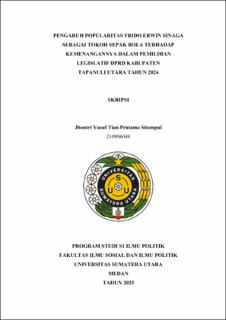Pengaruh Popularitas Frido Erwin Sinaga Sebagai Tokoh Sepak Bola Terhadap Kemenangannya Dalam Pemilihan Legislatif Dprd Kabupaten Tapanuli Utara Tahun 2024
The Influence of Frido Erwin Sinaga’s Popularity as a Football Figure on His Victory in the 2024 Legislative Election for the DPRD of North Tapanuli Regency

Date
2025Author
Sitompul, Jhontri Yusuf Tian Pratama
Advisor(s)
Nasution, Faiz Albar
Metadata
Show full item recordAbstract
This study aims to analyze the influence of Frido Erwin Sinaga's popularity as a football figure on his victory in the 2024 Legislative Election for the DPRD (Regional House of Representatives) of North Tapanuli Regency. The popularity of public figures from the sports world often serves as a form of social capital that can be converted into political power, particularly in regions with strong emotional ties to local figures.
This research adopts a quantitative approach using a survey method by distributing questionnaires to 97 respondents who were voters in Frido Erwin Sinaga’s electoral district. The independent variable in this study is popularity, measured through four indicators: public recognition of the figure, media exposure, personal connections, and background. The dependent variable is electoral victory, analyzed through the lens of political mobilization theory—both direct and indirect forms.
The findings indicate a positive and significant influence between popularity and electoral success, with a significance value of < 0.001 and a coefficient of determination (R²) of 0.339. This implies that 33.9% of the electoral victory can be explained by the popularity factor, while the remaining 66.1% is influenced by other factors such as party strength, political strategies, and kinship ties. Empirically, Frido’s vote count increased from 2,114 votes in the 2019 election to 2,514 votes in 2024, indicating a substantial contribution of his rising popularity to his success.
This study reinforces the popularity theory proposed by Holilah (2023), which posits that social existence in a specific field can generate political influence. Furthermore, the results support the theory of political mobilization, in which popularity functions as a medium for both direct mobilization through community engagement and indirect mobilization through the symbolic reputation of public figures.
Collections
- Undergraduate Theses [1123]
